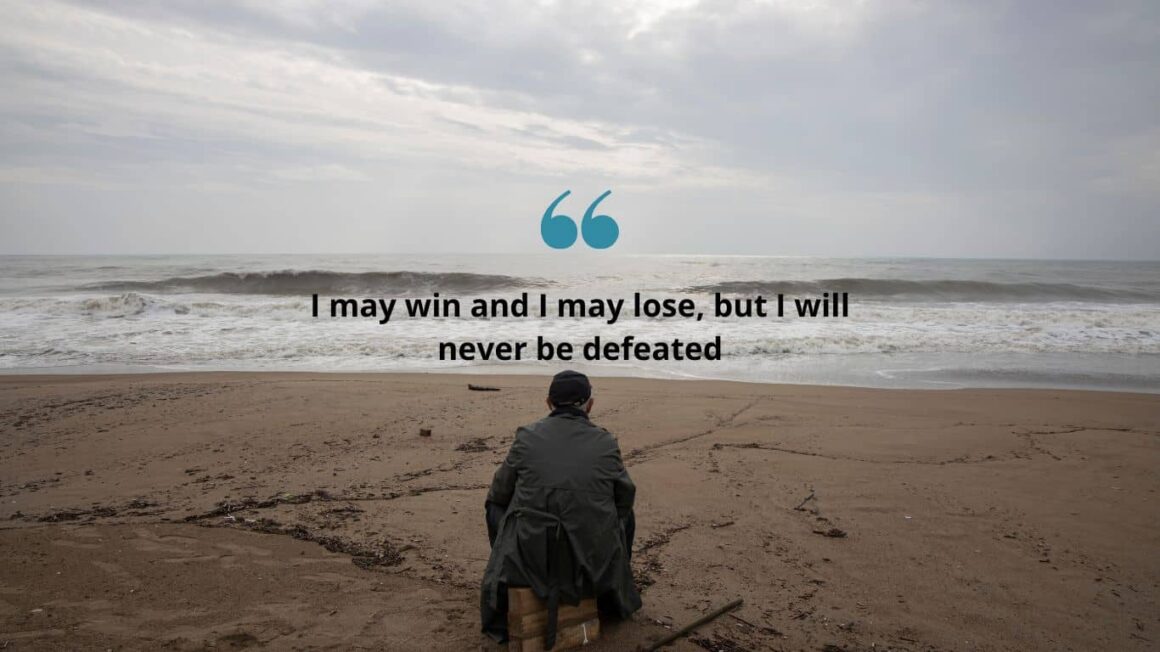“I may win and I may lose, but I will never be defeated.” These powerful words encapsulate a mindset that champions resilience, determination, and an unwavering spirit. Throughout history, countless individuals have faced obstacles, setbacks, and failures, yet they refused to be defeated by their circumstances. Their stories inspire us to embrace the challenges we encounter in our own lives with the same indomitable spirit.
Throughout our journey in life, we will encounter moments of triumph and moments of defeat. However, true success lies not in the number of victories we achieve, but in our ability to face challenges head-on and learn from both our wins and losses. By adopting a mindset that refuses to be defeated, we can cultivate resilience, grow from failure, and ultimately find fulfillment and success in our endeavors. Let us delve into the power of this mindset and discover how it can transform our lives.
Understanding the Nature of Winning and Losing
Winning and losing are universal concepts that transcend different areas of life. In sports, winning typically refers to outperforming opponents and achieving victory. In the realm of career and professional endeavors, winning may involve attaining goals, receiving promotions, or accomplishing significant milestones. Similarly, in relationships, winning can be seen as fostering meaningful connections, maintaining harmony, and experiencing love and support. On the other hand, losing represents falling short of desired outcomes, facing setbacks, or experiencing disappointment and failure.
Winning often brings feelings of joy, satisfaction, and a sense of accomplishment. It boosts self-confidence and validates one’s efforts and abilities. Conversely, losing can evoke emotions such as frustration, sadness, and self-doubt. It may lead to a temporary sense of defeat or demoralization. It is crucial to recognize that these emotions are a natural response to outcomes, but they do not define a person’s worth or potential.
It is important to remember that winning and losing are fleeting moments in our journey. They do not reflect the entirety of our abilities, character, or future potential. A single victory does not guarantee eternal success, nor does a defeat signify permanent failure. Our worth and potential go far beyond these momentary outcomes. By understanding this, we can detach our self-worth from external validation and focus on personal growth, resilience, and the pursuit of our passions.

The Power of Resilience
Resilience is the ability to adapt, bounce back, and thrive in the face of adversity. It involves a combination of mental, emotional, and psychological strength that enables individuals to withstand and overcome difficult circumstances. Resilience is crucial because it allows us to navigate challenges, learn from setbacks, and emerge stronger and more capable than before.
Thomas Edison, who faced numerous failures before inventing the light bulb, or J.K. Rowling, who overcame rejection and personal hardships to become a bestselling author with the Harry Potter series. These individuals serve as powerful examples of how resilience can lead to incredible achievements.
Resilience is not a fixed trait; it can be nurtured and developed over time. Strategies, such as practicing self-care, building a support system, maintaining a positive mindset, setting realistic goals, and embracing challenges as opportunities for growth can cultivate resilience within a person. By actively working on developing resilience, individuals can strengthen their ability to face adversity and remain determined in the face of setbacks.
Embracing Failure as a Stepping Stone to Success
Failure is often viewed negatively, but it is important to reframe our perspective. Failure provides valuable lessons and insights that can propel us towards success. It offers opportunities for growth, self-reflection, and improvement. By embracing failure as a learning experience, we can extract wisdom from our mistakes and use it to refine our approach.
The growth mindset is the belief that abilities and intelligence can be developed through dedication and hard work. It encourages individuals to view failure as a temporary setback rather than a reflection of their worth or potential. By reframing failures as stepping stones on the path to success, we can maintain motivation, persistence, and a willingness to learn from our experiences.
Conclusion
Throughout this article, we have explored the mindset of “I may win and I may lose, but I will never be defeated.” We have delved into the understanding of winning and losing, recognizing their temporary nature and their inability to define our worth or potential. We have highlighted the power of resilience, showcasing how it enables us to overcome challenges and thrive in the face of adversity. Moreover, we have discussed the importance of embracing failure as a stepping stone to success, reframing setbacks as opportunities for growth and learning.
Also Read: The only thing worse than being blind is having sight but no vision




